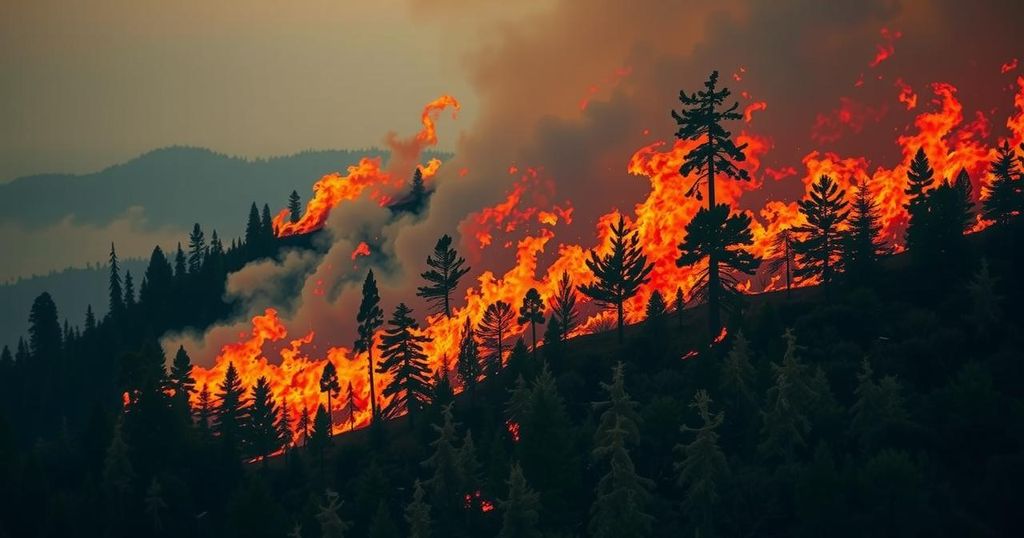Research indicates that climate change is causing an increase in wildfires globally, linked to a tenfold rise in smoke-related deaths over the past fifty years. Two studies highlight this concerning trend, showing regional variations where some areas experience declining wildfires while others, like California and Siberia, witness increases. The studies emphasize the urgency of addressing greenhouse gas emissions and implementing effective land management to mitigate wildfire risks.
Recent research provides compelling evidence linking climate change to the rising frequency and severity of wildfires globally, as well as a significant increase in smoke-related fatalities. Two studies, conducted by researchers at Dalhousie University and other institutions from Belgium, the United Kingdom, and Japan, investigate the correlation between wildfire dynamics and human health outcomes, indicating a dramatic increase in mortality associated with wildfire smoke over the decades. In the 1960s, fewer than 669 deaths were attributed to wildfire smoke; this figure surged to 12,566 per year in the 2010s. One study, published in the journal “Nature Climate Change,” utilized wildfire models to assess conditions with and without climate change influences. The findings reveal that, particularly in sensitive ecosystems like the African savannas, Australia, and Siberia, wildfires are becoming both more frequent and intense, though regional variations are detected. Notably, while Africa has experienced a decline in wildfires—attributed to increased human activity and land management—areas like California and Siberia are witnessing a rise in fires, driven by prolonged droughts and heightened temperatures stemming from climate change. Dr. Sian Kou-Giesbrecht of Dalhousie University remarked, “The study is important because it shows and quantifies the influence of climate change on increasing wildfires worldwide, especially given the impacts of wildfire on society and its feedback to climate change.” Utilizing complex models that account for climate, vegetation, and population density, the researchers emphasize that, although human interventions such as fire suppression can mitigate wildfire spread, their effectiveness diminishes during extreme weather conditions. Lead author Seppe Lampe from Vrije Universiteit Brussel stated, “What is striking is that in periods with low to moderate numbers of fires, direct human interventions have a large effect. However, in periods with many fires, the effect of climate change dominates, meaning that in these cases we lose control.” The simulations conducted revealed that from 2003 to 2019, climate change exacerbated global burned areas by approximately 16 percent, while the likelihood of experiencing months with above-average global burned area increased by 22 percent. In response, the papers advocate for immediate and sustained reductions in greenhouse gas emissions alongside effective land and fire management strategies to mitigate the negative consequences on biodiversity, human health, and ecosystems. A second study published concurrently offers alarming data indicating that the proportion of wildfire smoke-related deaths attributed to climate change increased tenfold over the past fifty years. Researchers from the National Institute for Environmental Studies and others utilized advanced modeling techniques to attribute global human mortality to fire-related fine particulate emissions, finding that climate change accounted for 1-3 percent of fire deaths in the 1960s, escalating to 28 percent in the 2010s. The regions most adversely affected included South America, Australia, Europe, and the boreal forests of Asia.
The increasing threat of wildfires globally has become a significant concern, primarily attributed to climate change’s adverse effects on weather patterns and ecosystems. Wildfires pose serious risks to human health and safety, leading to direct fatalities and serious health issues due to smoke exposure. The need to understand the interplay between climate change and wildfire dynamics is critical to developing effective interventions to prevent severe ecological and societal impacts. Recent research highlights these links, emphasizing the urgent need for coordinated global efforts in climate action and forest management to combat the rising tide of wildfires and their devastating consequences.
The findings of these studies underscore the profound impact of climate change on the frequency and intensity of wildfires worldwide, revealing alarming trends in wildfire-related fatalities over the past several decades. The perpetration of human activities, while able to mitigate some fire risks, is insufficient to fully counterbalance the accelerating dangers posed by climate change, particularly during extreme weather events. The call for immediate, sustained action on greenhouse gas emissions and robust fire management strategies is more urgent than ever to protect human lives, health, and ecosystems from the escalating threats of wildfires.
Original Source: www.dal.ca






